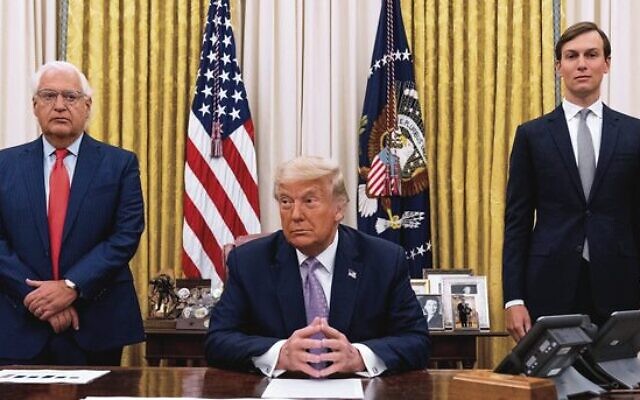Kushner: Friedman went rogue
'I grabbed my chair so intensely that my knuckles turned white, as if my grip could make Bibi stop.'

Former US ambassador to Israel David Friedman went rogue when he told then-prime minister Benjamin Netanyahu that the Trump administration would back plans to annex large parts of the West Bank, ex-White House senior adviser Jared Kushner maintains in his new book.
Kushner’s account appears to contradict Friedman, who insisted in his own memoir that he was in lock step with Kushner on the issue of annexation, which he personally supported.
“The accusation that I was running my own agenda with Netanyahu about [applying Israeli] sovereignty [to parts of the West Bank] and not letting the president know, not letting anybody know, contrary to the wishes of Jared – it’s 100 per cent false, 100 per cent false,” Friedman told The Times of Israel in February.
But Kushner tells a different story in Breaking History: A White House Memoir, set to be published on August 23.
He recalls being enraged as Netanyahu used his speech at the January 2020 White House unveiling of the Trump peace plan to announce that the president had become the first world leader to recognise Israel’s sovereignty over much of the West Bank and that as a result Israel would be moving to annex all the West Bank settlements and the Jordan Valley.
“This was not what we had negotiated,” writes Kushner.
“I grabbed my chair so intensely that my knuckles turned white, as if my grip could make Bibi stop. I had explicitly asked Israeli ambassador [to the US] Ron Dermer to make sure Bibi kept his remarks brief and above the politics of the day,” Kushner continues. “In both tone and substance, the speech was way off the mark. It contained nothing magnanimous or conciliatory toward the Palestinians. It was essentially a campaign speech for his domestic political audience, and it misrepresented our plan.”
Kushner writes of his concern the annexation pledge would destroy his effort to garner backing for the peace plan from Arab countries, three of whom had sent ambassadors to the ceremony.
“I had walked them through the peace proposal and given them my word that [then-US president Donald] Trump would present a dignified and balanced proposal – one that required compromises on both sides. But that certainly wasn’t the deal Bibi was describing,” Kushner writes.
“Had the rollout gone according to plan, it would have put [Palestinian Authority President Mahmoud] Abbas in an impossible position. Reacting harshly against a credible proposal would further alienate him while exposing the hollowness of his position. But the Israeli prime minister had given Abbas exactly the kind of opening he needed to reject our plan.
“As it turned out, ambassador David Friedman had assured Bibi that he would get the White House to support annexation more immediately. He had not conveyed this to me or anyone on my team,” Kushner writes.
He writes that he then confronted Friedman, who insisted that he had accurately represented the Trump proposal. He told Friedman he was ignoring the wider implications of Netanyahu’s claims.
“‘You haven’t spoken to a single person from a country outside of Israel,’ I shot back. ‘You don’t have to deal with the Brits, you don’t have to deal with the Moroccans, and you don’t have to deal with the Saudis or the Emiratis, who are all trusting my word. I have to deal with the fallout of this. You don’t,'” he writes.
Friedman began to recognise the damage Netanyahu’s speech had caused and indicated readiness to back down, Kushner writes.
TIMES OF ISRAEL

comments